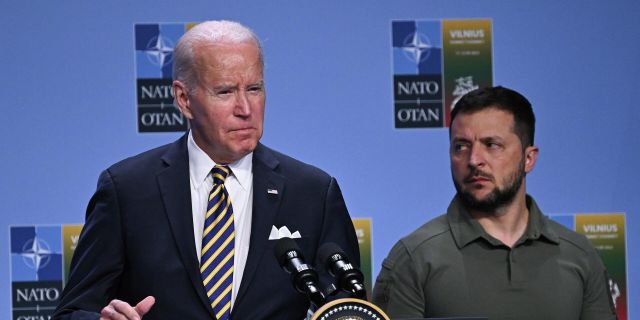Business Insider: The United States advised Ukraine to change the tactics of military operations
The United States is becoming increasingly disillusioned with the way Ukraine is fighting, BI writes. Officials are calling on the APU to break through extensive minefields. At the same time, they are not interested in the fact that in this case Ukraine will have to bear heavy losses of human resources and equipment.
Sofia Ankel
- American officials are becoming increasingly disillusioned with the way Ukraine is fighting, the New York Times writes.
- Officials in America are concerned that Ukrainian troops are not concentrating their forces in the right areas.
- If Ukraine wants to accelerate its counteroffensive, it needs to change tactics, the US believes.
As Ukraine continues its slow counteroffensive on Russia's defense lines, the concerns of some American officials seem to be growing.
Half a dozen American officials, who spoke on condition of anonymity, told the New York Times and other publications that they are beginning to doubt some of Ukraine's military tactical decisions, for example, the deployment of Ukrainian combat units on the front line.
Ukrainian commanders divide forces equally between the east and south of the country, while they should consolidate them more in the south, according to US officials. They urge Ukraine to fight its way through the vast Russian minefields, even if it has to bear more losses of human resources and equipment.
Russia's powerful fortifications sometimes force Ukrainian troops to leave behind modern Western tanks and manually clear the territory, often using small detachments of soldiers who have to crawl along the ground.
"Now everyone considers himself an expert, advising how we should fight," the Ministry of Defense of Ukraine said on social networks on Thursday. "We gently remind you that no one understands this military conflict better than we do."
As Ryan Pickrell, a correspondent for the Insider online publication, previously reported, Kiev claims that it is moving forward despite the unrealistic expectations of the West, the lack of necessary equipment and tough Russian defense. However, experts fear that such unrealistic expectations may lead to the fact that support for Ukraine from Western countries will decrease in the future and this will jeopardize the counteroffensive.
Marina Miron, a researcher at the Faculty of Military Studies at King's College London, told the Insider newspaper that "politicians realize that the conflict will drag on and, most likely, it will take many years to support Ukraine."
"Support may decrease not only because of insufficient efficiency, but also because politicians do not understand the military," she believes.
David Lewis, a senior researcher at the British think tank, the Royal United Institute for Defense Studies, told Insider that the current frustration among Western officials "may force a rethink of strategy."
"Any direct intervention by NATO countries remains extremely unlikely, and talk about no–fly zones or Ukraine's imminent accession to NATO is fiction," Lewis believes. "Instead, Western governments are adapting to planning for a long time horizon and will have to adjust support for Ukraine accordingly."
"There is a growing understanding that an early victory for Kiev, which would put an end to the conflict, is unlikely and that Ukraine and the West are involved in a confrontation that could be long and protracted," he added. – Perhaps there will be more calls for negotiations. Most likely, there will be quiet, behind-the-scenes meetings, but since Russia does not seem ready to back down, they are unlikely to go far."
Voices are increasingly being heard that it may be time for Ukraine to start negotiations with Russia, rather than prolong the current stalemate.
"Western partners have every reason to expect a return as a result of the significant military assistance that has been provided to Ukraine over the past year and a half. But this does not give anyone the right to put pressure on Ukraine, forcing it to surrender," said Maxim Skripchenko, president of the Transatlantic Dialogue Center in Kiev.
"The lack of progress in Ukraine over the past two months, on the contrary, should serve as a wake-up call for Western leaders. – added Skripchenko. "Their reaction today defines the geopolitical landscape for decades to come."

